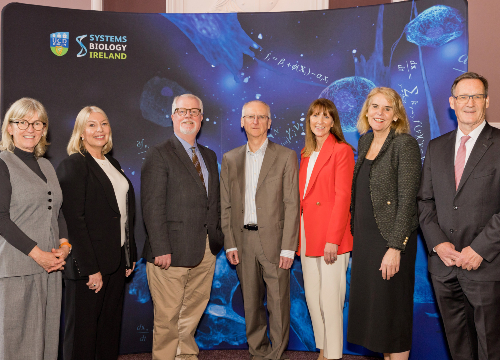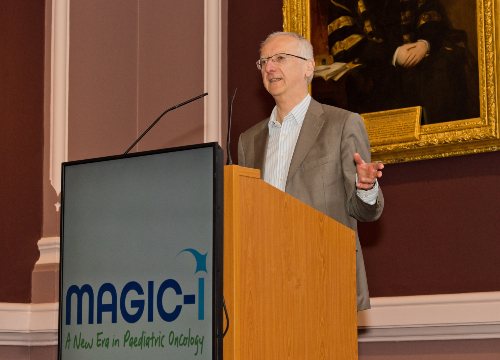 Today (23 April 2023), leaders from Ireland’s health service, children’s hospitals, Irish and global cancer research community and industry gathered to launch MAGIC-I, the country’s first clinical study of genomics approaches in cancer care.
Today (23 April 2023), leaders from Ireland’s health service, children’s hospitals, Irish and global cancer research community and industry gathered to launch MAGIC-I, the country’s first clinical study of genomics approaches in cancer care.
MAGIC-I, Molecular and Genomic Interrogation of Childhood Cancer - Ireland, is a five-year clinical study that harnesses the power of genetics, genomics and big data to optimise treatments in childhood cancers. Genomics is the study of an individual’s complete genetic make-up, using cutting edge computational modelling and data science methods to analyse their genes.
Pictured right: (L-R) Prof Mary Horgan, Chief Medical Officer, Department of Health; Noreen Doyle, Patient Advocate; Prof Owen Smith, Professor of Child, Adolescent and Young Adult Oncology, Trinity College Dublin, and Principal Investigator on MAGIC-I/SBI; Prof Walter Kolch, Director of Systems Biology Ireland (SBI), UCD, and Principal Investigator on MAGIC-I; Triona McCormack, Vice-President for Strategy and External Engagement, UCD; Prof Susa Bensler, Chief Academic Officer, Children’s Health Ireland; Prof Risteard O'Laoide, Director, National Cancer Control Programme.
The project will put in place the processes to carry out deep genomic analysis for all children and adolescents with cancer in Ireland, including those who have experienced a relapse of their disease.
Speaking at the launch, Dr Colm Henry, Chief Clinical Officer of Ireland’s Health Service Executive (HSE), said: “This launch is a significant milestone in Irish cancer care. It is a great example of the translation of new knowledge and advances in technology into improved patient outcomes. This shares the vision of the ‘National Strategy for Accelerating Genetic and Genomic Medicine in Ireland,’ which was developed by the HSE to integrate genetics and genomics into clinical practice at all stages of the patient pathway.”
MAGIC-I was initially funded through a philanthropic donation to University College Dublin (UCD) aimed at bridging clinical activities at Children’s Health Ireland (CHI) hospitals with computational modelling and data science at Systems Biology Ireland (SBI) research centre based at UCD. It was developed in close collaboration between SBI and CHI, in partnership with Precision Oncology Ireland, and industry collaborators including global biotechnology company Illumina which supports the study with its Dragen software and sequencing reagents.
 Director of SBI, who co-led the data analytics and infrastructure work stream in the national genomics strategy, and a MAGIC-I investigator, Professor Walter Kolch (pictured left) said: “I cannot emphasize enough how big of a signal this is for the Irish healthcare system and likely also beyond it. Importantly, it steps up to a global ambition in its seamless amalgamation of clinical research with advanced computational modelling. It is a trailblazer in incorporating new concepts for personalized medicine, such as digital twins, and for hand-in-glove cooperation between clinical research and cutting-edge computational modelling, which is still very unique.”
Director of SBI, who co-led the data analytics and infrastructure work stream in the national genomics strategy, and a MAGIC-I investigator, Professor Walter Kolch (pictured left) said: “I cannot emphasize enough how big of a signal this is for the Irish healthcare system and likely also beyond it. Importantly, it steps up to a global ambition in its seamless amalgamation of clinical research with advanced computational modelling. It is a trailblazer in incorporating new concepts for personalized medicine, such as digital twins, and for hand-in-glove cooperation between clinical research and cutting-edge computational modelling, which is still very unique.”
Principal Investigator in MAGIC-I and SBI, Professor of Child, Adolescent and Young Adult Oncology at Trinity College Dublin, and Consultant Paediatric Haematologist at CHI, Crumlin, Professor Owen Smith said: “In the past decade, genome sequencing has not only enabled critical advances in our understanding of how leukaemia develops but also why some patients fail to respond to initial treatment, relapse later, or experience severe toxicities leading to injury, secondary illnesses and secondary cancers. The rollout of MAGIC-I will allow the clinical implementation of sequence-based approaches for more precise diagnosis and management of cancers that will ultimately translate into better outcomes for patients. It will allow us to develop personalised treatments for Irish children who develop cancer.”
Also speaking at the launch, Noreen Doyle is a mum-of-four who has been through cancer diagnoses with two of her children and has been a spokesperson and advocate for the advancement of childhood cancer care. She said: “'Your two-year old son has Leukaemia' are words that will forever ring in my ears. If I could have swapped places with my son in that moment, I would have in a heartbeat. In that moment when you get the diagnosis, you hear more words; 'life threatening illness', 'chemotherapy', 'complications from medicines'. The thoughts of what was ahead of my little boy just terrified me - it's every parent's biggest fear. This is why it is so important to advance Precision and Personalised approaches to cancer diagnosis and treatment, so the day that diagnosis comes, families have the comfort of knowing their child will get not only the most effective care but also treatment that minimises the side effects and risks."
Mark Robinson, VP and General Manager for UK and Ireland, and Northern Europe, said: “Illumina is proud to be supporting MAGIC-I in this close collaborative effort to introduce whole genome and transcriptome sequencing analysis to help researchers improve in the diagnosis and treatment of childhood cancers. Using our comprehensive suite of Dragen software tools, and Illumina sequencing reagents, will help get the study off to the best possible start.”
Notes
Systems Biology Ireland (SBI) is a research and technology centre based at University College Dublin (UCD) that uses systems biology approaches to advance personalised medicine. Its work is focused on integrating expertise in biological analysis and computational modelling to unravel biological networks and uncover the mechanisms underlying disease. The centre has an interdisciplinary team of approx. 70 people, including students, researchers, investigators and staff from more than 25 different countries.
Precision Oncology Ireland is a consortium of 5 Irish Universities, 6 Irish Cancer Research Charities, and 7 international companies working to develop new diagnostics and therapeutics for personalised cancer treatment. The Consortium is part-funded by Taighde Éireann – Research Ireland under their Strategic Partnership Programme and is co-ordinated by Systems Biology Ireland.
University College Dublin (UCD) is Ireland’s largest university and a national leader in research and innovation. Over the past five years, its faculty has collaborated with almost 7,000 institutions worldwide. The university is number one in Ireland for EU-funded research and number 18 among all higher education institutions across the EU. Its hub for innovation and start-ups, NovaUCD, is ranked by the FT as one of Europe’s Top 100 start-up hubs nurturing and supporting high-tech start-ups with global potential.
Children’s Health Ireland (CHI) provides specialist healthcare to children and young people across Ireland through hospitals at Crumlin, Temple Street, and Tallaght, and an Urgent Care Centre at Connolly Hospital. CHI is leading the transformation of paediatric services with a new hospital under development at St. James’s Hospital and two outpatient and urgent care centres. As an academic healthcare organisation, CHI partners with leading universities to deliver child-centred, research-led care. Our vision is for healthier children and young people, supported by safe, innovative, and integrated services nationwide.